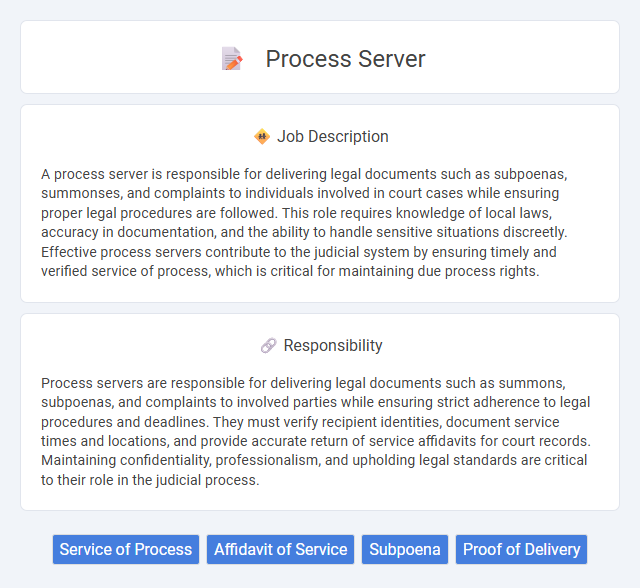
A process server is responsible for delivering legal documents such as subpoenas, summonses, and complaints to individuals involved in court cases while ensuring proper legal procedures are followed. This role requires knowledge of local laws, accuracy in documentation, and the ability to handle sensitive situations discreetly. Effective process servers contribute to the judicial system by ensuring timely and verified service of process, which is critical for maintaining due process rights.
Individuals who are detail-oriented, patient, and comfortable with face-to-face interactions will likely find a process server job suitable. The role may pose challenges for those who prefer sedentary work or have difficulty handling confrontational situations, as it often involves serving legal documents in diverse environments. Physical stamina and effective communication skills probably increase the chances of success in this occupation.
Qualification
Process servers must have a strong understanding of legal procedures and court documents to ensure accurate delivery of summons and subpoenas. Qualifications typically include a high school diploma or equivalent, with many jurisdictions requiring specific training, certification, or licensing to operate legally. Excellent communication skills, attention to detail, and knowledge of local laws are essential for effective and compliant service of process.
Responsibility
Process servers are responsible for delivering legal documents such as summons, subpoenas, and complaints to involved parties while ensuring strict adherence to legal procedures and deadlines. They must verify recipient identities, document service times and locations, and provide accurate return of service affidavits for court records. Maintaining confidentiality, professionalism, and upholding legal standards are critical to their role in the judicial process.
Benefit
Process server jobs likely offer flexible work hours and the opportunity to work independently, which appeals to many seeking autonomy in their careers. The role may provide steady income with the potential for increased earnings through efficiency and volume of work. Benefits could also include gaining extensive knowledge of legal procedures and building valuable connections within the legal system.
Challenge
Process servers often face challenges related to locating recipients who may intentionally avoid service, making it difficult to complete legal document delivery efficiently. The probability of encountering hostile or uncooperative individuals is high, requiring strong communication skills and situational awareness. Navigating complex jurisdictions and maintaining accurate records further contributes to the demanding nature of the job.
Career Advancement
Process servers facilitate the delivery of legal documents, ensuring court proceedings move smoothly and efficiently. Career advancement often involves gaining certifications, specializing in areas such as civil or criminal cases, or progressing to managerial roles overseeing legal support teams. Increased expertise and a strong network can lead to higher earning potential and opportunities within law enforcement or legal administration.
Key Terms
Service of Process
Process servers are responsible for the service of process, which involves delivering legal documents such as summons, complaints, subpoenas, and court orders to defendants or involved parties. Accurate and timely service ensures due process in legal proceedings and compliance with jurisdictional rules. Process servers must maintain detailed records of service efforts and adhere strictly to state and federal regulations governing notification protocols.
Affidavit of Service
A process server is responsible for delivering legal documents to parties involved in a court case, ensuring proper legal notification. The Affidavit of Service is a crucial document completed by the process server, detailing the date, time, location, and method of service to confirm that documents were correctly delivered. This affidavit serves as evidence in court to validate that all parties have been informed according to legal requirements.
Subpoena
Process servers specialize in delivering legal documents, with subpoenas being a critical part of their responsibilities. A subpoena commands an individual to testify or produce evidence in court, requiring timely and accurate service to uphold due process. Effective subpoena service ensures parties receive proper notice, helping courts maintain procedural integrity and enabling fair legal proceedings.
Proof of Delivery
Process servers specialize in delivering legal documents such as subpoenas, summons, and complaints to involved parties, ensuring proper legal notification. Proof of delivery is a critical part of their job, involving detailed documentation including time, date, location, and recipient's signature to verify the served documents. This verification supports court procedures by providing legally admissible evidence that the legal notice was properly executed.
 kuljobs.com
kuljobs.com